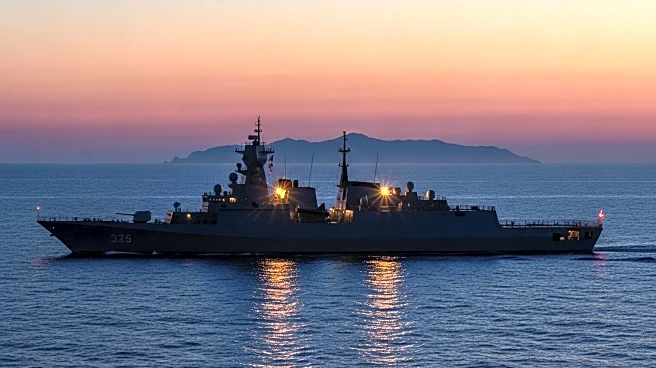What's Happening?
The American Enterprise Institute, in collaboration with the Institute for the Study of War, has released a comprehensive update on China's military strategy concerning Taiwan. The report highlights China's use of satellites to potentially aid Russian military operations in Ukraine, suggesting a strategic alliance that could provide China with valuable operational experience. Additionally, the report details China's expansion of mock Taipei training grounds in Inner Mongolia, indicating a focus on realistic military exercises aimed at Taiwan. The update also discusses the increasing number of Taiwanese citizens detained in China, reflecting China's assertion of jurisdiction over Taiwan. Furthermore, Taiwan's participation in the Warsaw Security Forum signals growing defense cooperation with European countries amidst rising tensions with China.
Why It's Important?
The developments outlined in the report have significant implications for U.S. foreign policy and defense strategy. China's potential support for Russia in Ukraine could shift global power dynamics, affecting U.S. interests in both Europe and the Indo-Pacific. The expansion of mock Taipei training grounds suggests China's readiness for potential military action against Taiwan, which could escalate regional tensions and impact U.S. commitments to Taiwan's defense. The detention of Taiwanese citizens by China raises human rights concerns and challenges international norms. Taiwan's engagement with European countries highlights the importance of building alliances to counterbalance China's influence, which is crucial for maintaining stability in the region.
What's Next?
The report suggests that the U.S. and its allies may need to reassess their strategies to deter China's aggression and support Taiwan's defense capabilities. Increased military cooperation between Taiwan and European countries could lead to stronger international support for Taiwan, potentially influencing U.S. policy decisions. The expansion of China's military training facilities may prompt Taiwan to further fortify its defenses, potentially leading to increased military spending and strategic partnerships. The U.S. may also need to address the human rights issues related to China's detention of Taiwanese citizens, which could impact diplomatic relations.
Beyond the Headlines
The report raises ethical and legal questions regarding China's actions, particularly its detention of Taiwanese citizens and its military strategies. These actions challenge international law and norms, potentially leading to broader geopolitical conflicts. The strategic alliance between China and Russia could signify a shift in global power structures, with long-term implications for U.S. foreign policy. The focus on realistic military exercises by China underscores the importance of preparedness and adaptability in modern warfare, which could influence military training and strategy worldwide.












